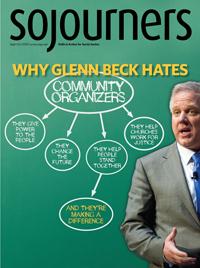
Sojourners Magazine: September/October 2010
When radio and TV personality Glenn Beck spits out the phrase “community organizers,” it sounds like a curse. President Obama, of course, was a community organizer in the Altgeld Gardens public housing project in Chicago when he was in his early 20s. That fact alone seems enough to sour Beck on organizers, about whom he has said, “These people are bullies. These people are thugs.” At other times he’s called them “agitators” bent on establishing a “thugocracy.”
As writer Danny Duncan Collum explains in this issue, Christians are involved in community organizing as public witness to their faith. Churches recognize that sin is not only personal, but also social and economic. Community organizing empowers disenfranchised people to redress the structural sin that leaves them in poverty or at the mercy of corporate greed. When churches address issues of social justice and act with dignity in the public square, they provide an effective—and evangelical—witness to the gospel.
Beck articulates the fears of the rich and powerful when he warns, “So, while these community organizers appear to be agitating for one seemingly noble goal or another, their underlying mission is ... ‘how the have-nots can take power from the haves.’” On that score, Beck may be right. Congregation-based community organizing puts into action Mary’s Magnificat: “God has put down the mighty from their thrones, and exalted those of low degree; God has filled the hungry with good things, and the rich he has sent empty away” (Luke 1:52-53).